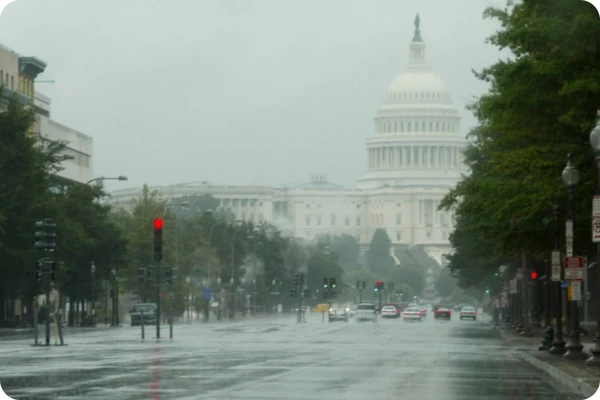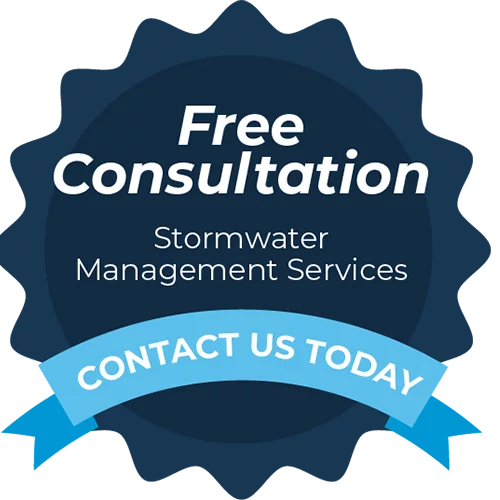Washington, DC’s stormwater challenges are unlike those in many other regions. With dense urban development, historic neighborhoods, and aging infrastructure, managing stormwater runoff is both a regulatory necessity and a practical challenge for property owners and managers. Understanding how local stormwater regulations intersect with infrastructure realities can help keep your property compliant, reduce flood risks, and protect the District’s waterways.
Why Stormwater Management is Critical in Washington, DC
DC’s combined sewer system, urban density, and proximity to the Potomac and Anacostia Rivers create unique stormwater pressures. Heavy rain events can quickly overwhelm outdated drainage systems, causing localized flooding, property damage, and pollution runoff into waterways. The District has implemented strict stormwater regulations to reduce these risks and meet federal Clean Water Act requirements.
Key DC Stormwater Regulations to Know
MS4 Permit Requirements
Much of Washington, DC is covered by a Municipal Separate Storm Sewer System (MS4) permit. Properties discharging into the MS4 must comply with requirements for pollution control, stormwater treatment, and maintenance reporting.
Stormwater Management Plans (SWMPs)
New developments, redevelopments, and some retrofits in DC require approved SWMPs. These plans ensure properties meet retention and treatment standards, often incorporating green infrastructure like bioretention areas or permeable pavement.
Erosion and Sediment Control (ESC) Standards
During construction or major site work, properties must implement ESC measures to prevent soil runoff, which can clog storm drains and degrade waterways.
Stormwater Retention Credit (SRC) Program
DC offers incentives for properties that exceed retention requirements, allowing them to sell credits to other developers or offset costs of compliance.
Challenges with DC’s Aging Stormwater Infrastructure
Outdated Drainage Systems
Many parts of DC still rely on infrastructure built decades ago. Smaller pipes and outdated catch basins may not accommodate today’s rainfall patterns, leading to backups and localized flooding.
Increased Impervious Surfaces
Historic rowhouse neighborhoods and commercial districts often lack green space. This means more runoff and less natural infiltration, stressing existing systems.
Retrofitting Constraints
Upgrading stormwater systems in dense urban areas can be complicated by limited space, historic preservation restrictions, and high costs for excavation or redesign.
Strategies for Property Managers and Owners
Conduct Regular Inspections
Frequent inspections of stormwater features – such as catch basins, retention ponds, or rain gardens – can catch small problems before they result in violations or costly damage.
Plan for Upgrades During Redevelopment
When renovating or expanding, incorporate modern stormwater controls like green roofs, permeable pavement, or underground detention systems to future-proof your property.
Stay Ahead of Compliance
Partnering with professionals who understand DC’s regulations helps avoid fines, NOVs (Notices of Violation), and costly emergency repairs.
Leverage Incentive Programs
Explore DC’s SRC program or green infrastructure grants to offset costs of retrofitting outdated systems.
Why Compliance Protects Your Property Value
Proactive stormwater management doesn’t just meet legal requirements; it reduces liability, enhances property value, and contributes to cleaner rivers and healthier urban ecosystems. In a city where infrastructure challenges are ongoing, staying ahead of regulations ensures your property remains resilient for years to come.
📞 Call us at (410) 231-3455 or 💬 Contact us online to schedule a stormwater inspection or consultation in Washington DC.
Real Results
iStormwater LLC was an excellent choice. They made the process of the Stormwater pond repairs seamless. They took charge of the project and got the project approved and passing the inspection. We highly recommend them and would use them again.
Incredible stormwater management service. The owner John consulted on a property I manage and ended up saving us thousands of dollars in environmental fees from the government. Now, our property is compliant with the EPA and we have a great partner to keep us maintained on stormwater regulations over time.
So helpful with all of my water issues.
Great communication and leadership and a family friendly atmosphere. Thank you John!
In dense urban environments where space is limited but stormwater challenges are significant, tree box filters have emerged as one of the most efficient low-footprint...
- Annapolis
- Anne Arundel County
- Baltimore County
- Baltimore
- Bel Air South
- Bethesda
- Bowie
- Cecil County
- Charles County
- Columbia
- Gaithersburg
- Glen Burnie
- Howard County
- Montgomery County
- Pasadena
- Prince George’s County
- Rockville
- Severna Park
- St. Mary’s County




